Unit 2 Understanding each other Welcome to the unit 课件(共27张PPT)-2025-2026学年译林版(2020)选择性必修第四册
文档属性
| 名称 | Unit 2 Understanding each other Welcome to the unit 课件(共27张PPT)-2025-2026学年译林版(2020)选择性必修第四册 | 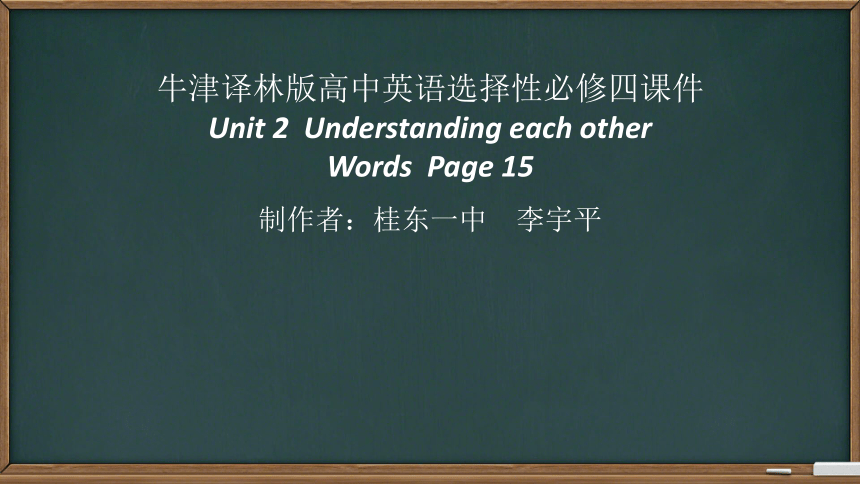 | |
| 格式 | pptx | ||
| 文件大小 | 265.5KB | ||
| 资源类型 | 教案 | ||
| 版本资源 | 牛津译林版(2019) | ||
| 科目 | 英语 | ||
| 更新时间 | 2025-06-19 09:57:07 | ||
图片预览

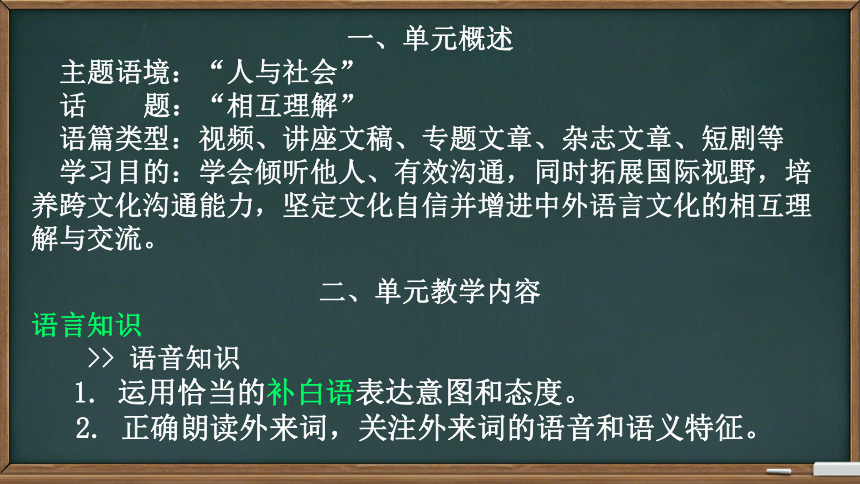
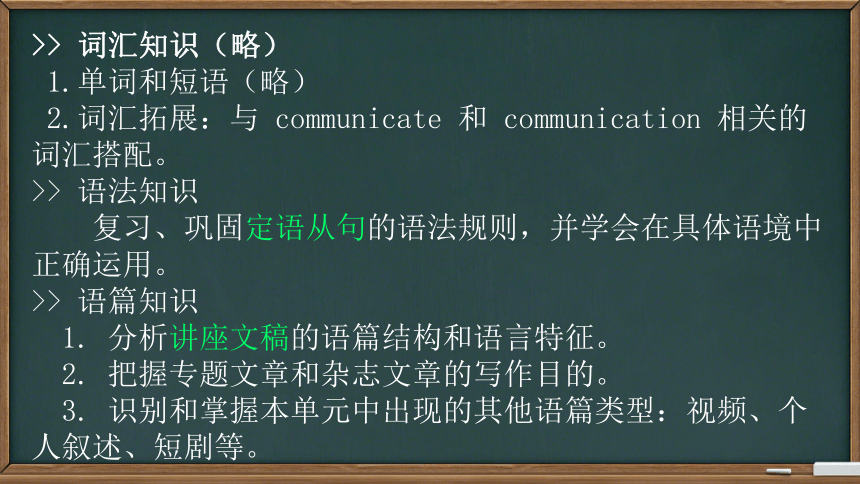
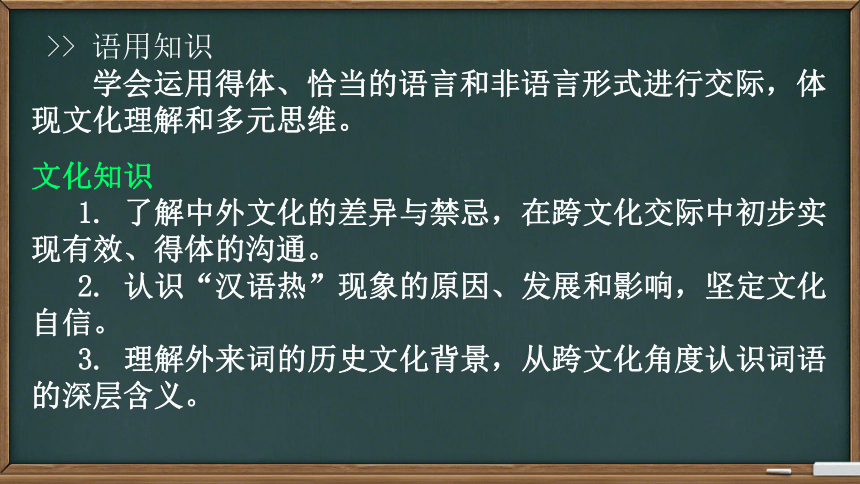
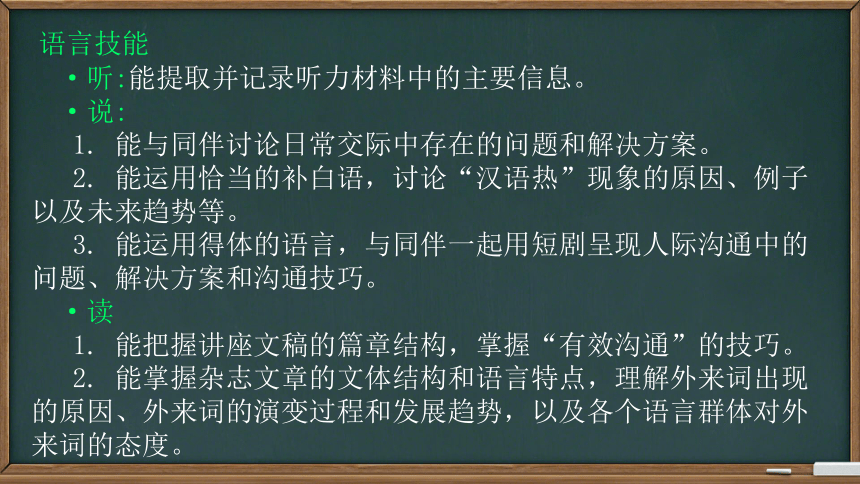
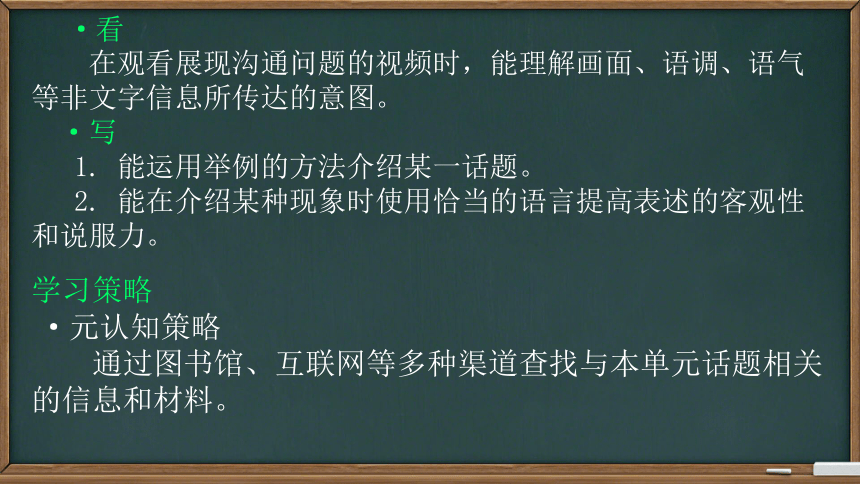
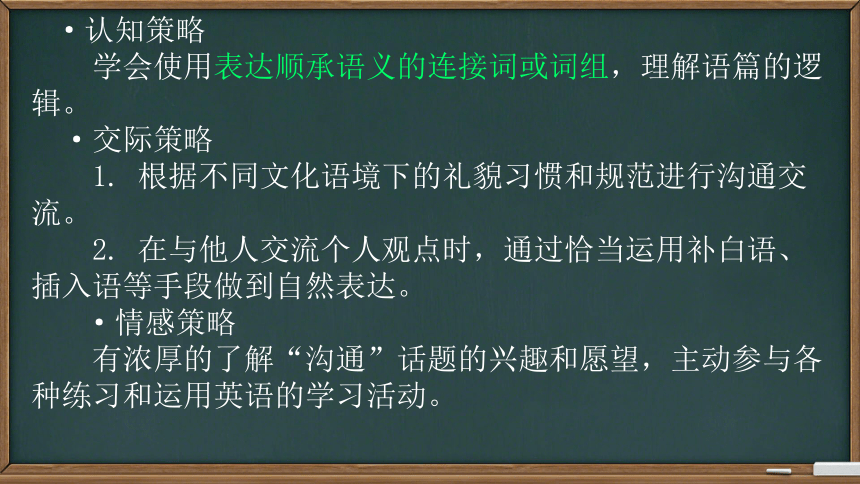
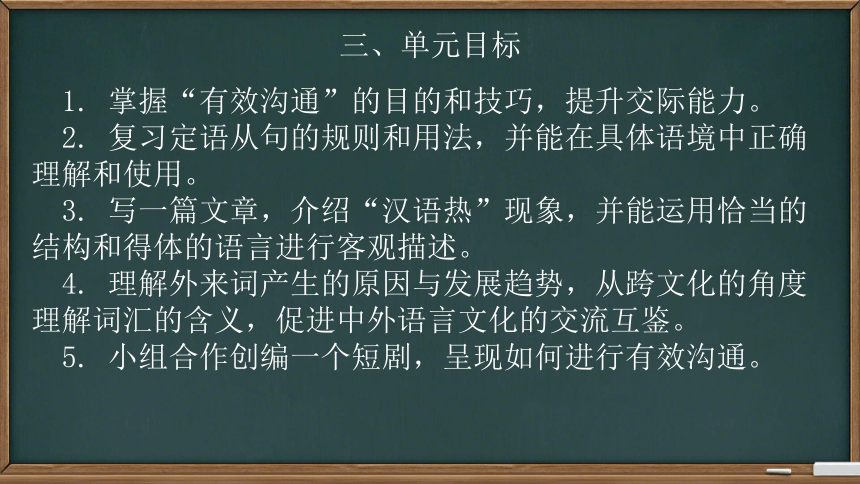
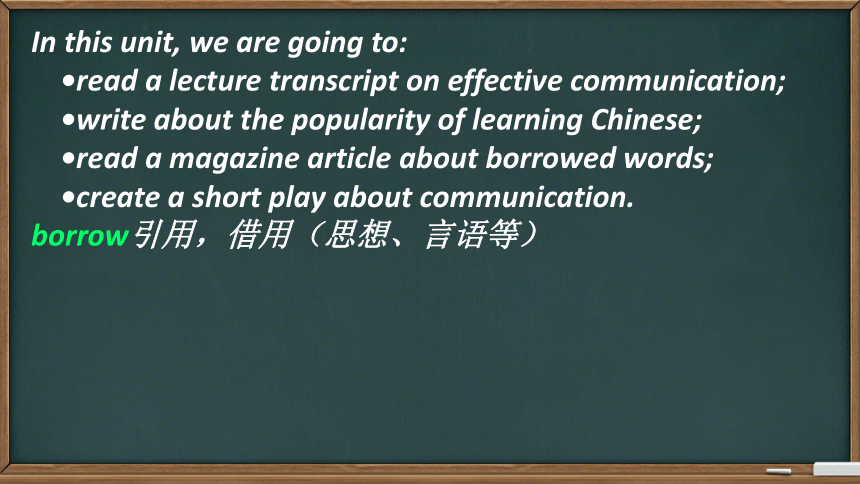
文档简介
(共27张PPT)
牛津译林版高中英语选择性必修四课件
Unit 2 Understanding each other
Words Page 15
制作者:桂东一中 李宇平
一、单元概述
主题语境:“人与社会”
话 题:“相互理解”
语篇类型:视频、讲座文稿、专题文章、杂志文章、短剧等
学习目的:学会倾听他人、有效沟通,同时拓展国际视野,培养跨文化沟通能力,坚定文化自信并增进中外语言文化的相互理解与交流。
二、单元教学内容
语言知识
>> 语音知识
1. 运用恰当的补白语表达意图和态度。
2. 正确朗读外来词,关注外来词的语音和语义特征。
>> 词汇知识(略)
1.单词和短语(略)
2.词汇拓展:与 communicate 和 communication 相关的词汇搭配。
>> 语法知识
复习、巩固定语从句的语法规则,并学会在具体语境中正确运用。
>> 语篇知识
1. 分析讲座文稿的语篇结构和语言特征。
2. 把握专题文章和杂志文章的写作目的。
3. 识别和掌握本单元中出现的其他语篇类型:视频、个人叙述、短剧等。
>> 语用知识
学会运用得体、恰当的语言和非语言形式进行交际,体现文化理解和多元思维。
文化知识
1. 了解中外文化的差异与禁忌,在跨文化交际中初步实现有效、得体的沟通。
2. 认识“汉语热”现象的原因、发展和影响,坚定文化自信。
3. 理解外来词的历史文化背景,从跨文化角度认识词语的深层含义。
语言技能
·听:能提取并记录听力材料中的主要信息。
·说:
1. 能与同伴讨论日常交际中存在的问题和解决方案。
2. 能运用恰当的补白语,讨论“汉语热”现象的原因、例子以及未来趋势等。
3. 能运用得体的语言,与同伴一起用短剧呈现人际沟通中的问题、解决方案和沟通技巧。
·读
1. 能把握讲座文稿的篇章结构,掌握“有效沟通”的技巧。
2. 能掌握杂志文章的文体结构和语言特点,理解外来词出现的原因、外来词的演变过程和发展趋势,以及各个语言群体对外来词的态度。
·看
在观看展现沟通问题的视频时,能理解画面、语调、语气等非文字信息所传达的意图。
·写
1. 能运用举例的方法介绍某一话题。
2. 能在介绍某种现象时使用恰当的语言提高表述的客观性和说服力。
学习策略
·元认知策略
通过图书馆、互联网等多种渠道查找与本单元话题相关的信息和材料。
·认知策略
学会使用表达顺承语义的连接词或词组,理解语篇的逻辑。
·交际策略
1. 根据不同文化语境下的礼貌习惯和规范进行沟通交流。
2. 在与他人交流个人观点时,通过恰当运用补白语、插入语等手段做到自然表达。
·情感策略
有浓厚的了解“沟通”话题的兴趣和愿望,主动参与各种练习和运用英语的学习活动。
三、单元目标
1. 掌握“有效沟通”的目的和技巧,提升交际能力。
2. 复习定语从句的规则和用法,并能在具体语境中正确理解和使用。
3. 写一篇文章,介绍“汉语热”现象,并能运用恰当的结构和得体的语言进行客观描述。
4. 理解外来词产生的原因与发展趋势,从跨文化的角度理解词汇的含义,促进中外语言文化的交流互鉴。
5. 小组合作创编一个短剧,呈现如何进行有效沟通。
In this unit, we are going to:
read a lecture transcript on effective communication;
write about the popularity of learning Chinese;
read a magazine article about borrowed words;
create a short play about communication.
borrow引用,借用(思想、言语等)
Welcome to the unit
◆ 内容分析
本板块的话题为“沟通问题”,通过多模态语篇
——视频,呈现了两位高中生朋友在交谈时出现的一系列沟通问题,以此激活我们的背景知识,引导我们分析产生问题的原因,并进行自我反思,为本单元的学习作好铺垫。
◆ 教学目标
By the end of this section, we will be able to:
1. interpret the quote about listening and speaking;
2. analyse communication problems and explore possible solutions;
3. share our experience of encountering communication problems.
We have two ears and one mouth so that we can listen twice as much as we speak.
—Epictetus/ ep k ti t s/
我们有两只耳朵和一张嘴巴,所以我们可以听到的是我们所说的两倍。
——爱比克泰德(古罗马哲学家)
What does the quote from Epictetus mean
I think the quote indicates that in communication, listening is more important than speaking. The quote encourages people to be good listeners and suggests
we should listen more and try to understand others, rather than rushing to share our own ideas first.
rush(使)仓促行事,匆忙行事,做事草率
What is the basic purpose of communication and how can you achieve that
I think the basic purpose of communication is to understand each other. This can be achieved by clearly stating one’s opinions, carefully listening to other
people and most importantly, respecting each other.
Communication problems occur from time to time. Watch the video and finish the following exercises.
David’s problem:
Jack’s problem:
He never really listens to what Jack is saying and only thinks of himself.
He cannot get David to listen to what he is saying and gets angry with David for not listening to him.
What does Jack’s action of looking at his watch imply
This implies that Jack is in a hurry. He is engaged somewhere else, and doesn’t have enough time to talk with David about his holiday plan. It also indicates that Jack is getting a little bit impatient.
imply / m pla / v.含有…的意思;暗示;暗指;说明;表明;必然包含;使有必要
en·gaged / n ɡe d d/ 忙于;从事于
im·pa·tient/ m pe nt/ 不耐烦的;没有耐心的;急于;热切期待;(对不愉快的事)不能容忍,不愿接受
Is Jack interested in what David is talking about
Do you think David is a good listener Why or why not
Not really. From the video, we can see that Jack not only looks at his watch and checks the contents of his sports bag, but also interrupts David several times, eager to tell David that he has to leave for football practice.
I don’t think David is a good listener. He is only interested in his own ideas and keeps talking without paying enough attention to his friend Jack’s responses.
Video script
David: (Taking a slow drink of his water, David puts his bottle down. His thoughts are obviously somewhere else.) I can’t wait for the holiday to come, Jack. What about
you
Jack: Yes, me too. (Looking at his watch)
David: Perhaps, one day, we can go to the beach together.
Jack: Yes, sure. (Checking the contents of his sports bag)
contents[ pl.]所容纳之物;所含之物;内容
David: Let’s do that, Jack. Let’s make a plan now. On the first warm, sunny day of the holiday we will jump on our bikes and head for the seaside.
Jack: Sure. Look, David, I really ...
David: (Interrupting Jack) I just enjoy the smell of the sea and I love to feel the sand beneath my feet. It’s just so relaxing ...
Jack: (Interrupting David and standing up) Listen, David, I really have to ...
David: The sea, well, just washes all your troubles away. It just carries them away on the tide ...
Jack: (Sitting down again) David! (In a raised voice, trying to get David’s attention) You’re doing it again. When talking about things, you will easily get carried away.But I really do need to go to football practice ...
David: (Dreamily) Yes, of course, we can play football on the beach. I have a ball, and we can take ...
raised /re zd/ 提高的;升高的;凸起的
get/be carried away变得很激动;失去自制力
Jack: David! Can you hear me (In a raised voice, trying to get David’s attention)
David: (Looking at Jack) Of course I can hear you. You were saying that we can practise football on the beach this summer ...
Jack: (Looking at David and shaking his head) You are my best friend, but sometimes you make me angry, like now! You’re a dreamer and you never really listen to what I’m
saying.
dream·er / dri m (r)/ 做白日梦的人;出神的人;神不守舍的人;梦想家;空想家;不切实际的人;做梦的人
It’s always about you! Now, listen to what I’m saying very carefully. I’ve got to go. (Jack says this very slowly and deliberately. He picks up his sports bag and starts to leave.)
David: Hey, Jack, I can hear the sea calling us. Where are you going
Jack: (Looking at David in disbelief) You haven’t heard a word I’ve said!! (In a loud voice) Unbelievable! (Jack shakes his head.) Why do I bother with you (Jack leaves.)
de·lib·er·ate·ly /d l b r tli/不慌不忙地;小心翼翼地;从容不迫地; 故意;蓄意;存心;
bother使(某人)烦恼(或担忧、不安);给(某人)造成麻烦(或痛苦)
David: (David folds his arms across his chest and says out loud.) And, I was listening to you. I just didn’t know that you were so interested in basketball ...
fold your arms双臂交叉在胸前
1.What would you do if you were David or Jack
If I were David, I would pay more attention to Jack’s responses and interruptions. By doing that, I would be more aware that he is not able to have a conversation with me about my holiday ideas now, because he needs to go to football practice.
If I were Jack, I would wait for David to finish speaking instead of constantly interrupting him. In that way, David might become aware that he is having a one-sided conversation. If David stopped talking, I could let him know what I think of his ideas and that I must leave for football practice.
one-sided(论点、意见等 ) 片面的;偏颇的;(竞争或关系 ) 实力悬殊的;一边倒的
2.What kinds of communication problems have you encountered
I can mention three communication problems I have encountered. First, we sometimes finish off the other person’s sentences or interrupt him or her by saying, “I know exactly what you mean ...”, and then go on to tell him or her our own ideas. We might be correct in guessing the message, but it is not polite to the other person. Second, we are sometimes not aware of the cultural differences in communication.
finish off完成;作最后加工
Nowadays many of us live in multicultural societies, and
not understanding people’s cultural backgrounds in communication might cause miscommunication or offence. Third, we might not be direct when communicating and fail to provide clarification when necessary. The result is that others could be confused about what we mean and try to read our mind. In this case, confusion and misunderstandings will occur. multi·cul·tural / m lti k lt r l/ 多元文化的;多种文化融合的
miscommunication 沟通失误,错误传达
clar·ify/ kl r fa / 使更清晰易懂;阐明;澄清
read sb's mind/thoughts猜测;揣摩
牛津译林版高中英语选择性必修四课件
Unit 2 Understanding each other
Words Page 15
制作者:桂东一中 李宇平
一、单元概述
主题语境:“人与社会”
话 题:“相互理解”
语篇类型:视频、讲座文稿、专题文章、杂志文章、短剧等
学习目的:学会倾听他人、有效沟通,同时拓展国际视野,培养跨文化沟通能力,坚定文化自信并增进中外语言文化的相互理解与交流。
二、单元教学内容
语言知识
>> 语音知识
1. 运用恰当的补白语表达意图和态度。
2. 正确朗读外来词,关注外来词的语音和语义特征。
>> 词汇知识(略)
1.单词和短语(略)
2.词汇拓展:与 communicate 和 communication 相关的词汇搭配。
>> 语法知识
复习、巩固定语从句的语法规则,并学会在具体语境中正确运用。
>> 语篇知识
1. 分析讲座文稿的语篇结构和语言特征。
2. 把握专题文章和杂志文章的写作目的。
3. 识别和掌握本单元中出现的其他语篇类型:视频、个人叙述、短剧等。
>> 语用知识
学会运用得体、恰当的语言和非语言形式进行交际,体现文化理解和多元思维。
文化知识
1. 了解中外文化的差异与禁忌,在跨文化交际中初步实现有效、得体的沟通。
2. 认识“汉语热”现象的原因、发展和影响,坚定文化自信。
3. 理解外来词的历史文化背景,从跨文化角度认识词语的深层含义。
语言技能
·听:能提取并记录听力材料中的主要信息。
·说:
1. 能与同伴讨论日常交际中存在的问题和解决方案。
2. 能运用恰当的补白语,讨论“汉语热”现象的原因、例子以及未来趋势等。
3. 能运用得体的语言,与同伴一起用短剧呈现人际沟通中的问题、解决方案和沟通技巧。
·读
1. 能把握讲座文稿的篇章结构,掌握“有效沟通”的技巧。
2. 能掌握杂志文章的文体结构和语言特点,理解外来词出现的原因、外来词的演变过程和发展趋势,以及各个语言群体对外来词的态度。
·看
在观看展现沟通问题的视频时,能理解画面、语调、语气等非文字信息所传达的意图。
·写
1. 能运用举例的方法介绍某一话题。
2. 能在介绍某种现象时使用恰当的语言提高表述的客观性和说服力。
学习策略
·元认知策略
通过图书馆、互联网等多种渠道查找与本单元话题相关的信息和材料。
·认知策略
学会使用表达顺承语义的连接词或词组,理解语篇的逻辑。
·交际策略
1. 根据不同文化语境下的礼貌习惯和规范进行沟通交流。
2. 在与他人交流个人观点时,通过恰当运用补白语、插入语等手段做到自然表达。
·情感策略
有浓厚的了解“沟通”话题的兴趣和愿望,主动参与各种练习和运用英语的学习活动。
三、单元目标
1. 掌握“有效沟通”的目的和技巧,提升交际能力。
2. 复习定语从句的规则和用法,并能在具体语境中正确理解和使用。
3. 写一篇文章,介绍“汉语热”现象,并能运用恰当的结构和得体的语言进行客观描述。
4. 理解外来词产生的原因与发展趋势,从跨文化的角度理解词汇的含义,促进中外语言文化的交流互鉴。
5. 小组合作创编一个短剧,呈现如何进行有效沟通。
In this unit, we are going to:
read a lecture transcript on effective communication;
write about the popularity of learning Chinese;
read a magazine article about borrowed words;
create a short play about communication.
borrow引用,借用(思想、言语等)
Welcome to the unit
◆ 内容分析
本板块的话题为“沟通问题”,通过多模态语篇
——视频,呈现了两位高中生朋友在交谈时出现的一系列沟通问题,以此激活我们的背景知识,引导我们分析产生问题的原因,并进行自我反思,为本单元的学习作好铺垫。
◆ 教学目标
By the end of this section, we will be able to:
1. interpret the quote about listening and speaking;
2. analyse communication problems and explore possible solutions;
3. share our experience of encountering communication problems.
We have two ears and one mouth so that we can listen twice as much as we speak.
—Epictetus/ ep k ti t s/
我们有两只耳朵和一张嘴巴,所以我们可以听到的是我们所说的两倍。
——爱比克泰德(古罗马哲学家)
What does the quote from Epictetus mean
I think the quote indicates that in communication, listening is more important than speaking. The quote encourages people to be good listeners and suggests
we should listen more and try to understand others, rather than rushing to share our own ideas first.
rush(使)仓促行事,匆忙行事,做事草率
What is the basic purpose of communication and how can you achieve that
I think the basic purpose of communication is to understand each other. This can be achieved by clearly stating one’s opinions, carefully listening to other
people and most importantly, respecting each other.
Communication problems occur from time to time. Watch the video and finish the following exercises.
David’s problem:
Jack’s problem:
He never really listens to what Jack is saying and only thinks of himself.
He cannot get David to listen to what he is saying and gets angry with David for not listening to him.
What does Jack’s action of looking at his watch imply
This implies that Jack is in a hurry. He is engaged somewhere else, and doesn’t have enough time to talk with David about his holiday plan. It also indicates that Jack is getting a little bit impatient.
imply / m pla / v.含有…的意思;暗示;暗指;说明;表明;必然包含;使有必要
en·gaged / n ɡe d d/ 忙于;从事于
im·pa·tient/ m pe nt/ 不耐烦的;没有耐心的;急于;热切期待;(对不愉快的事)不能容忍,不愿接受
Is Jack interested in what David is talking about
Do you think David is a good listener Why or why not
Not really. From the video, we can see that Jack not only looks at his watch and checks the contents of his sports bag, but also interrupts David several times, eager to tell David that he has to leave for football practice.
I don’t think David is a good listener. He is only interested in his own ideas and keeps talking without paying enough attention to his friend Jack’s responses.
Video script
David: (Taking a slow drink of his water, David puts his bottle down. His thoughts are obviously somewhere else.) I can’t wait for the holiday to come, Jack. What about
you
Jack: Yes, me too. (Looking at his watch)
David: Perhaps, one day, we can go to the beach together.
Jack: Yes, sure. (Checking the contents of his sports bag)
contents[ pl.]所容纳之物;所含之物;内容
David: Let’s do that, Jack. Let’s make a plan now. On the first warm, sunny day of the holiday we will jump on our bikes and head for the seaside.
Jack: Sure. Look, David, I really ...
David: (Interrupting Jack) I just enjoy the smell of the sea and I love to feel the sand beneath my feet. It’s just so relaxing ...
Jack: (Interrupting David and standing up) Listen, David, I really have to ...
David: The sea, well, just washes all your troubles away. It just carries them away on the tide ...
Jack: (Sitting down again) David! (In a raised voice, trying to get David’s attention) You’re doing it again. When talking about things, you will easily get carried away.But I really do need to go to football practice ...
David: (Dreamily) Yes, of course, we can play football on the beach. I have a ball, and we can take ...
raised /re zd/ 提高的;升高的;凸起的
get/be carried away变得很激动;失去自制力
Jack: David! Can you hear me (In a raised voice, trying to get David’s attention)
David: (Looking at Jack) Of course I can hear you. You were saying that we can practise football on the beach this summer ...
Jack: (Looking at David and shaking his head) You are my best friend, but sometimes you make me angry, like now! You’re a dreamer and you never really listen to what I’m
saying.
dream·er / dri m (r)/ 做白日梦的人;出神的人;神不守舍的人;梦想家;空想家;不切实际的人;做梦的人
It’s always about you! Now, listen to what I’m saying very carefully. I’ve got to go. (Jack says this very slowly and deliberately. He picks up his sports bag and starts to leave.)
David: Hey, Jack, I can hear the sea calling us. Where are you going
Jack: (Looking at David in disbelief) You haven’t heard a word I’ve said!! (In a loud voice) Unbelievable! (Jack shakes his head.) Why do I bother with you (Jack leaves.)
de·lib·er·ate·ly /d l b r tli/不慌不忙地;小心翼翼地;从容不迫地; 故意;蓄意;存心;
bother使(某人)烦恼(或担忧、不安);给(某人)造成麻烦(或痛苦)
David: (David folds his arms across his chest and says out loud.) And, I was listening to you. I just didn’t know that you were so interested in basketball ...
fold your arms双臂交叉在胸前
1.What would you do if you were David or Jack
If I were David, I would pay more attention to Jack’s responses and interruptions. By doing that, I would be more aware that he is not able to have a conversation with me about my holiday ideas now, because he needs to go to football practice.
If I were Jack, I would wait for David to finish speaking instead of constantly interrupting him. In that way, David might become aware that he is having a one-sided conversation. If David stopped talking, I could let him know what I think of his ideas and that I must leave for football practice.
one-sided(论点、意见等 ) 片面的;偏颇的;(竞争或关系 ) 实力悬殊的;一边倒的
2.What kinds of communication problems have you encountered
I can mention three communication problems I have encountered. First, we sometimes finish off the other person’s sentences or interrupt him or her by saying, “I know exactly what you mean ...”, and then go on to tell him or her our own ideas. We might be correct in guessing the message, but it is not polite to the other person. Second, we are sometimes not aware of the cultural differences in communication.
finish off完成;作最后加工
Nowadays many of us live in multicultural societies, and
not understanding people’s cultural backgrounds in communication might cause miscommunication or offence. Third, we might not be direct when communicating and fail to provide clarification when necessary. The result is that others could be confused about what we mean and try to read our mind. In this case, confusion and misunderstandings will occur. multi·cul·tural / m lti k lt r l/ 多元文化的;多种文化融合的
miscommunication 沟通失误,错误传达
clar·ify/ kl r fa / 使更清晰易懂;阐明;澄清
read sb's mind/thoughts猜测;揣摩
同课章节目录
